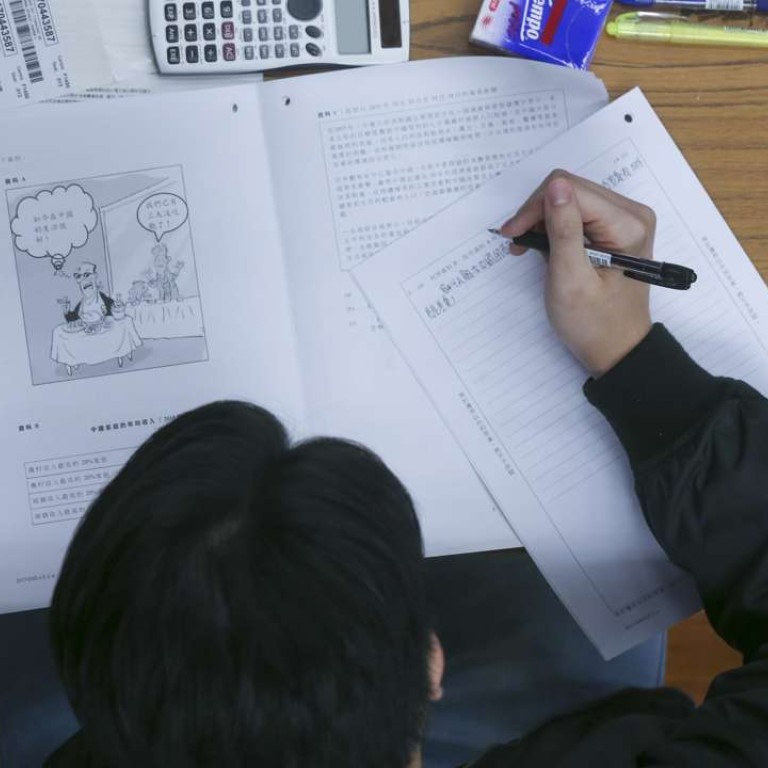
Make Hong Kong’s TSA test a real tool for learning, rather than one for management
Kerry Kennedy says Hong Kong has strayed far from the vision of its own education reform, and if the culture isn’t changed, getting rid of the TSA or its replacement won’t ease pressure on students
Parents who think all their problems will be solved if the Territory-wide System Assessment (TSA) is abolished will be sadly disappointed. Hong Kong’s education system, like many other systems in the Asia-Pacific region, is based on widespread testing from the earliest years through to the Diploma in Secondary Education (DSE). Hardly a week goes by for students in Hong Kong schools where they do not face a barrage of tests – it is part of the culture of schooling. The TSA is currently seen by many as part of that culture but this view runs counter to the original intention of education reform proposals.
It’s not just the TSA; Hong Kong’s education system is built to ruin happy childhoods
For one thing, we must recognise the role Hong Kong publishers play in our current predicament. It did not take them long to see that there was a market in producing mock TSA exam papers. This includes both local and international publishers.
Walk into any school education bookstore in Hong Kong and there is bound to be a section on TSA mock papers. For parents, this is often seen as an opportunity to help their children get ahead by practising TSA-like questions. For teachers and schools, it is also an opportunity to help their schools move ahead by having students practise these questions. This is where the charge of drilling comes from, because students practise answers over and over again.
Yet the real problem is with the publishers who see the TSA as yet another way to make money out of education. Why will they view the BCA any differently?
Of course, no one forces either parents or schools to buy mock exam papers and in this sense publishers simply make them available. Yet there is a remarkably competitive spirit among Hong Kong schools that are constantly seeking to improve their “market” position.
Parents, teachers and schools can stop buying mock exam papers, and publishers will soon stop producing them
While TSA results are in general confidential, school principals can share results with the management committees, often a source of pressure on principals to obtain better results. This kind of pressure can then be brought to bear on individual teachers, who resort to mock exams and drilling as a response.
In 2014, a Legislative Council committee heard that TSA data was also inappropriately shared to make comparisons among schools.
All of this adds further pressure for schools to perform, leading to drilling for results. The situation will be the same for the proposed BCA.
Schools that come under the Education Bureau’s jurisdiction undergo on a cyclical basis what is known as the External School Review. There have until recently been quite explicit links between this review process and TSA results as a measure of how well a school has been performing academically. This issue has been addressed for the newly proposed BCA and it removes one pressure for drilling to get results – this is good news for concerned parents.
There seems little doubt that the TSA has been distorted beyond the original idea to make it a new form of assessment that helps both schools and the education system to better understand what students are (and are not) learning. Most of these distortions will continue with the BCA, which will continue to be a tool for management rather than a tool to improve learning. But it does not need to be this way.
Hong Kong’s education system is still failing to prepare children for the future
Parents, teachers and schools can stop buying mock exam papers, and publishers will soon stop producing them. There is also no need for school management committees to receive BCA data since they can do nothing with it except exert downward pressure on schools.
Rather than abandon the TSA because of populist pressure, it would be better to refocus it on learning
The idea that assessment should aid learning and help students improve was the right idea in 2000 when it was promoted by the Education Commission. With a new chief executive, a new secretary for education and a new secretary general of the Hong Kong Examinations and Assessment Authority, it is time to revisit that vision.
Rather than abandon the TSA because of populist pressure, it would be better to refocus it on learning, remove it as a management tool and let Hong Kong teachers and parents get on with improving students’ learning.
Professor Kerry Kennedy is a senior research fellow in the Centre for Governance and Citizenship at The Education University of Hong Kong


